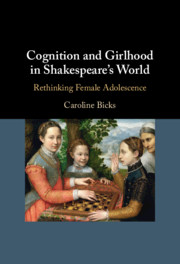Book contents
- Cognition and Girlhood in Shakespeare’s World
- Cognition and Girlhood in Shakespeare’s World
- Copyright page
- Dedication
- Contents
- Figures
- Acknowledgements
- Introduction
- Chapter 1 “A spectacle to men and angells”
- Chapter 2 “Imagination helps me”
- Chapter 3 “The progresse of an Art”
- Chapter 4 “If I should tell / My history”
- Chapter 5 “Put on the minde”
- Chapter 6 “From thirteene Yeares … resolved to serve God”
- Coda
- Notes
- Bibliography
- Index
Chapter 2 - “Imagination helps me”
Liberating Brainwork in Comus, Othello, and The Two Noble Kinsmen
Published online by Cambridge University Press: 24 June 2021
- Cognition and Girlhood in Shakespeare’s World
- Cognition and Girlhood in Shakespeare’s World
- Copyright page
- Dedication
- Contents
- Figures
- Acknowledgements
- Introduction
- Chapter 1 “A spectacle to men and angells”
- Chapter 2 “Imagination helps me”
- Chapter 3 “The progresse of an Art”
- Chapter 4 “If I should tell / My history”
- Chapter 5 “Put on the minde”
- Chapter 6 “From thirteene Yeares … resolved to serve God”
- Coda
- Notes
- Bibliography
- Index
Summary
Chapter Two focuses on imagination, the cognitive faculty allegedly residing in the front of the brain. Early moderns worried about this faculty especially, as it introduced harmful forms into girls’ minds and enabled them to produce illicit visions. But it also appears as a generative faculty in girls. The adolescents under consideration here use their imaginations to see beyond what is tangible and take on uniquely ameliorative roles in relation to dominant restrictive ideologies and damaging norms. The chapter begins with fifteen-year-old Alice Egerton and her performance as the Lady in John Milton’s Comus. Her imaginative brainwork emerges as a powerful, righteous phenomenon against her sorcerer-captor. Next, a reading of Othello’s Desdemona demonstrates how her extended imagination challenges the gender and race codes that inform the play’s basest mentalities. Desdemona also serves as a case study in how marriage binds the female mind to her husband’s fantasies, eventually limiting its cognitive reach. Finally, the chapter analyzes the teenagers of Fletcher and Shakespeare’s Two Noble Kinsmen. The “coining” brain of the Jailer’s Daughter is shown to complement and compound the brainwork of particular girls within and beyond the play — including Desdemona — and gives their previously contracted, suffocated body-minds a second life.
Keywords
- Type
- Chapter
- Information
- Cognition and Girlhood in Shakespeare's WorldRethinking Female Adolescence, pp. 65 - 104Publisher: Cambridge University PressPrint publication year: 2021



